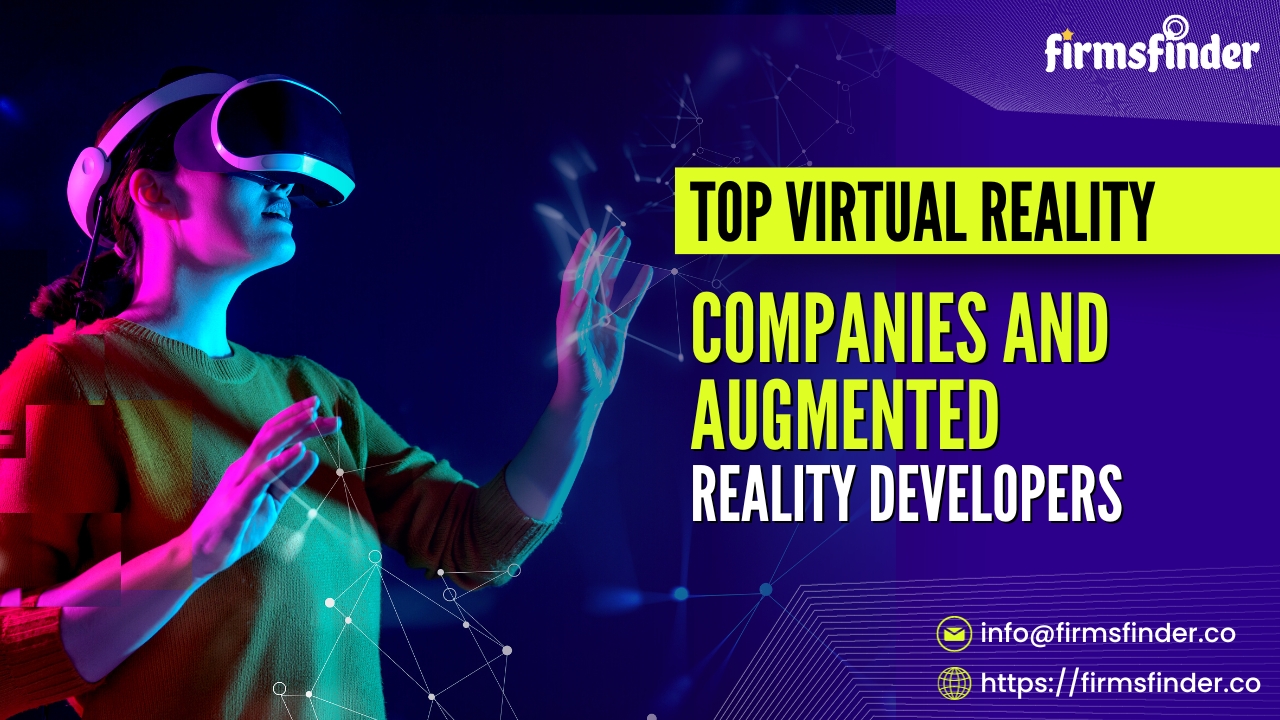
Top Virtual Reality Companies and Augmented Reality Developers
Extended reality (XR) has grown significantly in recent years, changing how we interact with digital information and our physical surroundings. Two revolutionary technologies that have gained prominence in XR are Augmented Reality (AR) and Virtual Reality (VR). While augmented reality (AR) superimposes digital features on the actual world to improve our view and interaction with it, virtual reality (VR) immerses users in fully digital surroundings. As a result of these technologies’ ongoing development, a large number of innovative businesses and developers have emerged, each of them making a distinct contribution to the XR revolution.
The top Virtual Reality companies and Augmented Reality developers that are leading the charge in XR innovation, showcasing their remarkable contributions to this evolving landscape.
Top Virtual Reality Companies:
1. Oculus
Oculus, a VR technology pioneer, has been instrumental in creating state-of-the-art VR headsets and experiences. The business, best known for the Quest series and Oculus Rift, keeps pushing the limits of virtual reality.
2. HTC Vive
VR headsets from HTC’s Vive range have garnered praise for their exceptional tracking and immersive experiences. They have continuously maintained their leadership position in the VR hardware industry.
3. Sony
VR has been introduced to the gaming world by Sony with the PlayStation VR. The company has become a major participant in the market thanks to its dedication to provide accessible, high-quality virtual reality experiences.
4. Valve Corporation
The PC-based VR ecosystem has benefited greatly from the collaboration between HTC and Valve on the Vive and from Valve’s SteamVR platform. Innovation in the VR sector has been encouraged by Valve’s dedication to an open platform.
5. Pimax
Pimax is well known for their VR headsets with a broad field of view. They’ve become a favorite’s among VR fans because of their emphasis on pushing the boundaries of immersion.
Augmented Reality Developers:
1. Niantic
The developer behind the groundbreaking AR game, Pokémon GO. Niantic has revolutionized the way people interact with their surroundings through mobile AR.
2. Magic Leap
One of the most eagerly awaited AR gadgets was Magic Leap One, the company’s AR headset. Both consumers and developers are captivated by their dedication to mixed reality experiences and spatial computing.
3. Microsoft
A flagship augmented reality product is Microsoft’s HoloLens series. The enterprise sector’s adoption of augmented reality (AR) is being propelled by their work on mixed reality applications utilizing Windows Mixed Reality and the Azure platform.
4. Google
With the help of Google’s ARCore, developers can now make AR apps for Android smartphones. With tools like Google Lens, the corporation is still at the forefront of augmented reality innovation.
5. Apple
Apple, along with several leading software firms, has added augmented reality (AR) capabilities to millions of iOS devices with ARKit. The creation of ARKit and the company’s future focus on AR glasses demonstrate its investment in AR technology.
These advancements, coupled with the collaborative efforts of top software firms, are shaping the future of augmented reality and its integration into our everyday lives.
The VR and AR Synergy:
While it’s important to identify the rising convergence of these two technological domains, it’s also important to distinguish between VR and AR companies and creators. Together, augmented reality (AR) and virtual reality (VR) may produce experiences that seamlessly blend the virtual and physical worlds.
Companies striving to create mixed reality experiences include Magic Leap, with its focus on spatial computing, and Microsoft, with its HoloLens. In a similar vein, programmers are combining VR and AR elements to create dynamic and engaging virtual worlds.
The distinctions between VR and AR are getting fuzzier as these technologies develop further. It’s not unusual to see businesses and developers working on projects that combine aspects of AR and VR, offering a variety of immersive experiences to suit various customer requirements and tastes.
Future Prospects:
The XR market is dynamic and full of both opportunities and difficulties. Artificial intelligence, augmented reality, and virtual reality have all become quite popular and have many uses outside of the game industry. XR technologies and the incorporation of artificial intelligence are having a big impact on all of these fields, from architecture and training to healthcare and education.
As technology develops, it will get more difficult to tell the difference between the actual and virtual worlds, giving consumers access to experiences that were previously limited to science fiction. Thanks to the innovative efforts of leading VR firms, AR producers, and AI-driven advancements, the future appears to offer even more immersive, compelling, and revolutionary XR experiences.
Conclusion
The world of XR is marked by innovation, with top Virtual Reality companies and Augmented Reality developers at the forefront. They are collectively pushing the boundaries of what is possible and ensuring that XR technologies continue to shape the way we perceive and interact with the world around us. As we move further into the XR revolution, it is exciting to anticipate the countless new possibilities that will unfold on this immersive journey.
FAQs
Q1. Which is best AR or VR?
AR users can control their presence in the real world; VR users are controlled by the system. VR requires a headset device, but AR can be accessed with a smartphone. AR enhances both the virtual and real world while VR only enhances a fictional reality.
Q2. Who is augmented reality developer?
AR/VR developers specialize in augmented reality (AR) or virtual reality (VR) experiences. You will find AR/VR Developer working at a number of different types of companies including Tech Companies, Gaming Companies, Design and Creative gencies, Educational Companies, VR/AR Specific Startups.
Q3. What is the future of VR developer?
The future of VR in these industries will likely involve more immersive training programs, virtual tours, product demonstrations, and therapeutic treatments, among other applications. The social aspects of VR platforms are likely to become more prominent in the future.
Jul 27 2024
